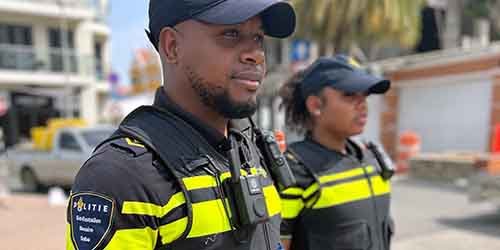Starting the 4th of April 2025, the Dutch Caribbean Police Force (Korps Politie Caribisch Nederland, KPCN) will officially use bodycams on Bonaire, St. Eustatius, and Saba. With this step, KPCN enhances safety, transparency, and trust between the police and the community.

Enhanced protection for citizens and police officers
Bodycams are small cameras worn visibly on police officers’ uniforms. They are used during checks, enforcement actions, interventions, and other operational activities. This technology objectively records situations, promotes professional conduct, and helps reduce tensions.
For citizens, bodycams provide extra reassurance that their interactions with the police are fair and handled with care. For officers, the footage serves as protection in cases of uncertainties or complaints. Additionally, recordings allow for incident analysis and continuous professional development. International experiences show that bodycams strengthen mutual trust and reduce the number of incidents.
Clear rules and strict privacy guidelines
KPCN uses bodycams following clear rules. Officers wear the cameras visibly and announce when they begin recording, either verbally or via a camera signal.
The footage is securely stored and used solely for investigation and complaint handling, following strict privacy regulations. Only authorized personnel have access under specific conditions. Storage duration is limited, and unnecessary footage is deleted in a timely manner.
Your rights as a citizen
If you are clearly identifiable in a bodycam recording, you are considered a “data subject” under the Police Data Act (Wpg, Article 1 under g), which gives you specific legal rights.
1. Right of access (Article 25 Wpg)
You may submit a written request to find out whether – and which – personal data about you has been processed by the police, including bodycam recordings.
2. Right to view recordings
If you appear in the footage, you may request access. However:
- Other individuals visible in the footage will first be blurred or anonymized.
- Access may be denied if necessary for operational reasons, the protection of others, or national security (Article 27 Wpg).
3. Right to correction or deletion
If you believe that the data is incorrect, incomplete, or unlawfully processed, you may request correction, supplementation, restriction, or deletion of the footage (Article 28 Wpg).
Your responsibilities as a citizen
While you have rights, there are also some clear boundaries:
- You cannot demand that an officer stop recording if it is necessary for police duties.
- You may not request bodycam footage for private use or publication, unless you are a data subject with a legitimate legal interest.
- Intentionally obstructing an officer wearing a bodycam (e.g. blocking or grabbing the device) is a criminal offense.
Want to file a complaint about bodycam use?
If you feel you were filmed unfairly, that recordings were mishandled, or that your rights were violated, you can file a complaint.
Complaint about the police | politiecn.com
More information?
Curious about how bodycams work, when they are used, and how KPCN protects your privacy? Visit our website: https://www.politiecn.com/en/subjects/bodycams-in-the-dutch-caribbean.html
KPCN

 Saba News News and Information from Saba Island, Dutch Caribbean
Saba News News and Information from Saba Island, Dutch Caribbean
